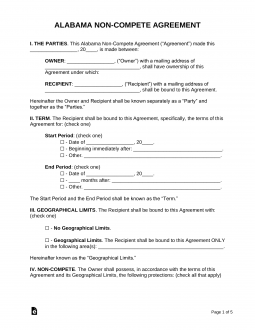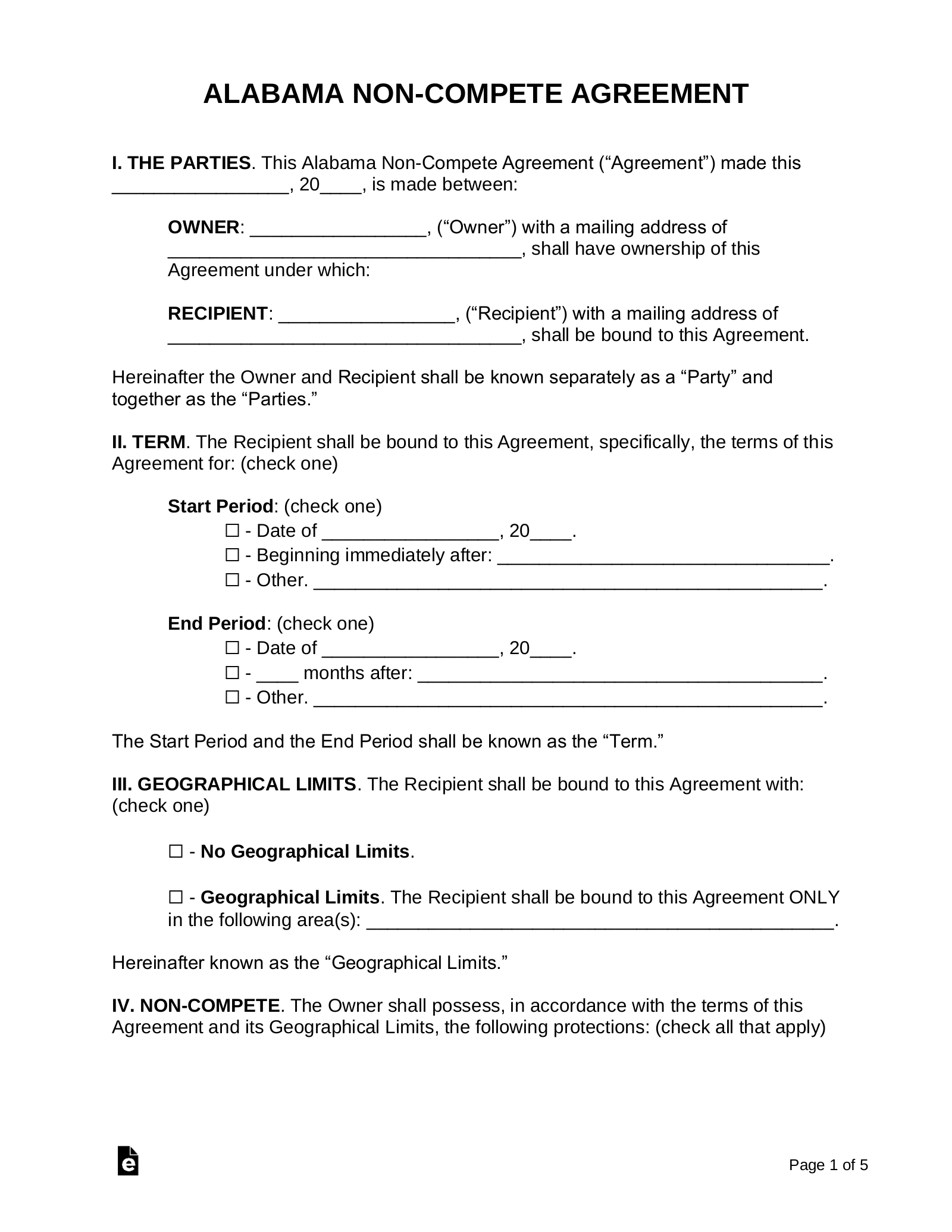Updated February 18, 2024
An Alabama non-compete agreement is a contract between an employer that prohibits an employee from entering into the same business. A company can require an individual to agree to a non-compete for a period of up to two (2) years and must be specified to a geographical area. Broad or unreasonable agreements are not allowed.
LAWS |
Legally Enforceable?
Yes, a non-compete is legal to preserve a protectable interest in Alabama.[1]
A non-complete is allowed for employees except those performing a “lawful profession.”[2]
There is no definition for the term “lawful profession,” although, the following court cases have decided specific types:
- Accountants. Considered a lawful profession.[3]
- Attorneys. Considered a lawful profession.[4][5]
- Exterminators (pest). NOT considered a lawful profession.[6]
- Optometrists. NOT considered a lawful profession.[7]
- Physicians. Considered a lawful profession.[8]
- Physical therapists. Considered a lawful profession.[9]
- Prosthetists. NOT considered a lawful profession.[10]
- Seasonal tax preparers. NOT considered a lawful profession.[11]
- Securities brokers. Considered a lawful profession.[12]
- Veterinarians. Considered a lawful profession.[13]
A non-compete with an independent contractor is not enforceable in Alabama.[14]
A seller of a business is permitted to be held to a non-compete for a period of up to 1 year. This is conditional upon the buyer continuing the same business after the sale. A specific geographical area for the non-compete must be defined in the agreement.[15]
If the partners or shareholders agree, a non-compete is permitted between the owners dissolving business entity. The non-compete would prevent any owner from creating or working in the same or similar business.[16]
What is a “Lawful Profession”?
The Alabama District Court has made several factors to be considered to what constitutes a lawful profession:
- Professional training, skill, and experience required to perform certain services;
- Delicate nature of the services offered; and
- The ability and need to make instantaneous decisions.[17]
Protectable Interest
A protectable interest, which is the basis for a non-compete in Alabama, is defined as the following:
- Trade secrets. A trade secret is information that is used or intended for use in a trade or business; is included or embodied in a formula, pattern, compilation, computer software, drawing, device, method, technique, or process; is not publicly known and is not generally known in the trade or business of the person asserting that it is a trade secret; cannot be readily ascertained or derived from publicly available information; is the subject of efforts that are reasonable under the circumstances to maintain its secrecy; and has significant economic value.[18]
- Confidential information. Including, but not limited to, pricing information and methodology; compensation; customer lists; customer data and information; mailing lists; prospective customer information; financial and investment information; management and marketing plans; business strategy, technique, and methodology; business models and data; processes and procedures; and company provided files, software, code, reports, documents, manuals, and forms used in the business that may not otherwise qualify as a trade secret but which are treated as confidential to the business entity, in whatever medium provided or preserved, such as in writing or stored electronically.
- Commercial relationships or contacts. With specific prospective or existing customers, patients, vendors, or clients.
- Goodwill. Customer, patient, vendor, or client goodwill associated with any of the following:
- An ongoing business, franchise, commercial, or professional practice, or trade dress.
- A specific marketing or trade area.
- Unique training. Specialized and unique training involving substantial business expenditure specifically directed to a particular agent, servant, or employee; provided that such training is specifically set forth in writing as the consideration for the restraint.[19]
Continued Employment
Continued employment is permitted as consideration for a non-compete in Alabama. No outside payment or promise is required.[20]
Maximum Period
Geographical Area
The duration and geographical area, in combination, must be “reasonable.”
See 4 sample cases below that were approved in the court:
- G.L.S & Associates, Inc. v. Keith Rogers (2014): 2 years and a 50-mile radius
- J.E. Hanger, Inc. v. Scussel (1996): 2 years and a 50-mile radius
- Central Bancshares of the South v. Puckett (1991): 2 years and Statewide
- Parker v. Ebsco Industries, Inc. (1968): 1 year and east of the rocky mountains
Blue Penciling Allowed
Yes, a court in Alabama may modify an agreement that is overly broad or unreasonable to be legal in accordance with State law.
If a contractually specified restraint is overly broad or unreasonable in its duration, a court may void the restraint in part and reform it to preserve the protectable interest or interests. If a contractually specified restraint does not fall within the limited exceptions set out in subsection (b) of Section 8-1-190, a court may void the restraint in its entirety.[22]
Sources
- Section 8-1-190
- Section 8-1-196
- Burkett v. Adams (1978)
- Rule 5.6
- Pierce v. Hand, Arendall, Bedsole, Greaves & Johnston (1996)
- Dobbins v. Getz Exterminators (1980)
- Board of Optometry v. Eagerton (1981)
- Odess v. Taylor (1968)
- Benchmark Medical Holdings, Inc. v. Barnes (2004)
- J.E. Hanger, Inc. v. Scussel (1996)
- H&R Block Eastern Enterprises Inc. v. Village Tax Team (2005)
- G.L.S & Associates, Inc. v. Keith Rogers (2014)
- Friddle v. Raymond (1991)
- Premier Indus. Corp. v. Marlow (1974)
- Section 8-1-190
- Section 8-1-190(6)
- Friddle v. Raymond (1991)
- Section 8-27-2(1)
- Section 8-1-191
- Daughtry v. Capital Gas Company (1970)
- Section 8-1-190(b)(4)
- Section 8-1-193


